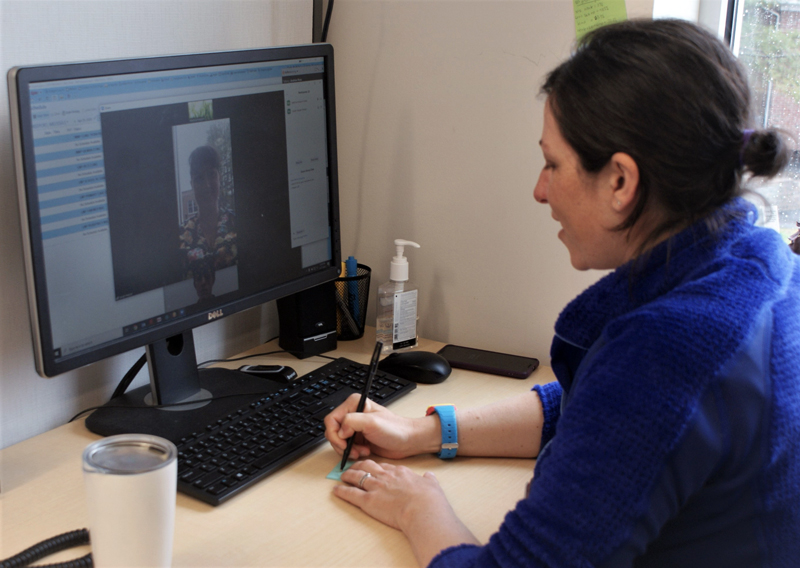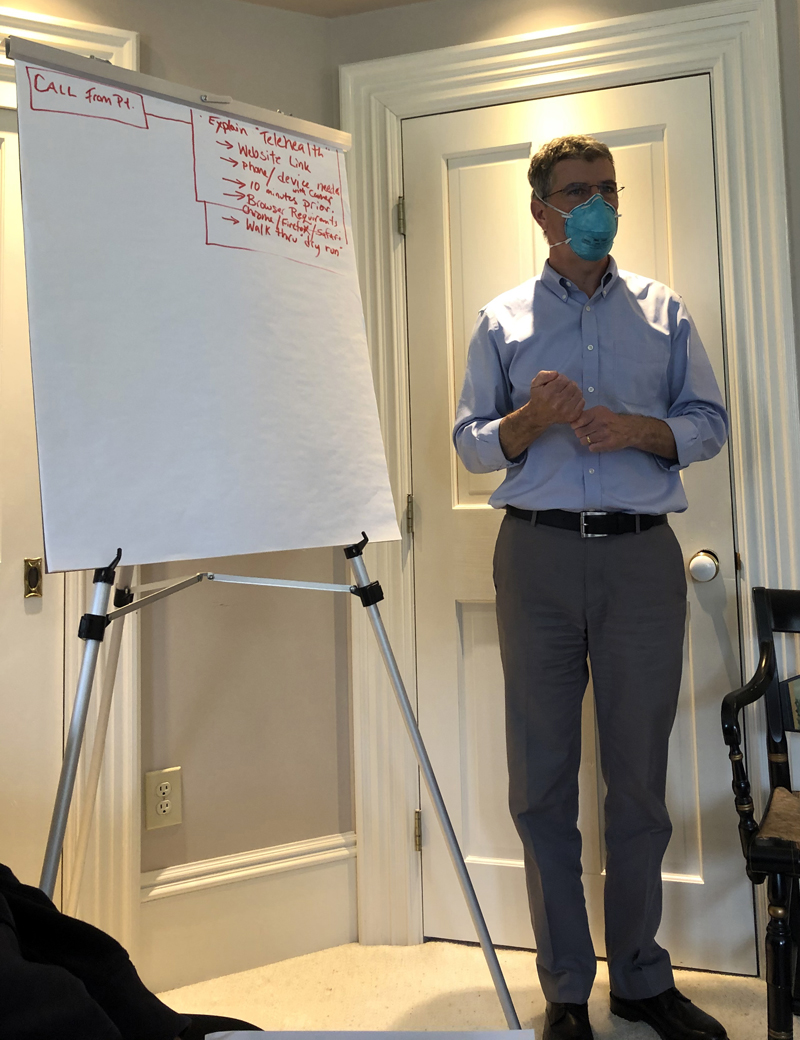
Dr. Melissa Keeport, a physician with Lincoln Medical Partners, speaks to a co-worker during a telehealth test run April 27. (Photo courtesy John Martins)
As the coronavirus arrived in Lincoln County, LincolnHealth and other local medical providers rapidly rolled out telehealth programs so they could continue to conduct regular appointments.
Dr. Daniel Friedland, who oversees LincolnHealth’s telehealth program on the medical side, said telehealth has been available for several years, but insurance companies only covered it for specialty services like pediatric psychiatry and stroke treatment.
A March 6 change in Medicare policy to cover all telehealth visits, as well as new state mandates regarding telehealth, both in response to the coronavirus, changed this. The visits are now billed exactly the same as an in-person visit, allowing for reimbursement from most insurance companies.
Telephone-only visits are discounted, according to Luke Fourre, LincolnHealth’s clinical applications specialist. Fourre oversees the telehealth program from a technical standpoint.
According to MaineHealth’s website, telehealth options include live, two-way video chats between patients and providers; monitoring devices to track vital signs; cameras to capture wound images; medical education and information; and messages via text or email.
Fourre said the rollout of a new program like telehealth would typically involve six months to a year of training and testing.
However, once COVID-19 reached Lincoln County, LincolnHealth staff had to learn the system and start using it within about one week.
“This was a trial by fire. It’s gone extremely well. I am very impressed with our staff,” Fourre said in a phone interview May 5.
As the hospital has received more Zoom licenses through its parent company, MaineHealth, and doctors have started to reschedule canceled visits that could be completed using telehealth, weekly visits jumped from 30 the first week to 272 last week.
Lincoln Medical Partners has held 1,705 telehealth visits since March 15, when the coronavirus first arrived in Lincoln County. Another 536 medical appointments have been completed by telephone.
Fourre said providers use a version of Zoom that is encrypted on both the patient’s and the provider’s end and cannot be easily hacked and subsequently “Zoom-bombed.”
Zoom-bombing is unwanted intrusion into a videoconference call. Fourre is not aware of any security breaches related to telehealth in the MaineHealth system.
Fourre said telehealth is being used for a variety of visits, such as annual wellness checks, behavioral health and social work, ophthalmology, and orthopedics.

Dr. Mike Clark discusses telehealth during a meeting with staff at Lifespan Family Healthcare in Newcastle on Thursday, May 7. Clark said the practice has conducted hundreds of telehealth visits since mid-March. (Photo courtesy Rebecca Clark)
“I’m surprised at how much utility LincolnHealth has gotten out of it,” Fourre said.
Friedland said feedback from patients has been overwhelmingly positive. Patients complete a survey after every visit.
“It’s clearly more convenient for patients to not have to drive however long they have to drive to get to the doctor’s office,” Friedland said.
Round Pond resident Phil Congdon, a Lincoln Medical Partners patient, said he was satisfied with his telehealth check-up, although it cannot replace an in-person visit. He said it constitutes about “50% of a regular visit.”
Congdon noted that, during a routine check-up like his, a doctor cannot take vital signs like pulse and blood pressure via telehealth.
“I think a lot of people would benefit from it that don’t know it’s available. If you have a computer, all you have to do is wait for the appointed time and click on it and you’re in,” Congdon said.
Congdon chairs the town of Bristol’s broadband committee, which is examining access to high-speed internet in the town and how to improve it. He said about 90% of all respondents to a committee survey said they want high-speed internet service specifically to participate in telehealth.
Friedland said the biggest challenge is getting people connected to the system and training them on the technology. For a patient without high-speed internet access or without a compatible device, a telephone visit is available, but a video connection is preferred.
Telephone appointments are “not ideal because we prefer to be able to see the person and see their emotions and reactions and that type of thing,” Friedland said. “Plus, if they have a rash or we’re looking at an elbow or something, we obviously can’t see it on the telephone.”
Fourre said every Lincoln Medical Partners location has at least one trained “super user” on staff to help patients set up the technology the day before a telehealth visit.
Friedland said LincolnHealth is rolling out a new program that will serve as a curbside or drive-up service, where an iPad already set up for the Zoom meeting will be provided to the patient in their vehicle. The iPad will use the office’s internet service, which extends into the parking lot.
Other local practices, such as Lifespan Family Healthcare in Newcastle, have also implemented telehealth now that most insurance companies are paying for the virtual visits.
Dr. Michael Clark, of Lifespan, said that after the March 6 Medicare policy change, the practice started researching videoconferencing software, seeking a program that was encrypted and compliant with privacy laws. Lifespan landed on Doxy.me LLC and started using the software in about one day.
Lifespan Family Healthcare began conducting telehealth visits in mid-March and has held hundreds of visits to date, averaging about 25-30 per day.
Clark said that although full physicals cannot be performed through telehealth, it is useful to check in with patients to make sure they are healthy and do not need further medical care.
Clark said he has been surprised by the diverse application of telehealth.
“We can actually do more than we thought we could. Patients can show us stuff like rashes, swelling. I’ve been able to coax someone through range of motion for their shoulder injury, show me what hurts, and come up with diagnoses,” Clark said.
He said telehealth is useful for looking at tick bites and effective for treating mental health issues.
The biggest challenges with telehealth are internet speeds and access, Clark said.
Friedland, of LincolnHealth, said there has also been a learning curve for staff because of the quick rollout. Despite the challenges, the new program will remain the preferred method for visits for at least the next year because of coronavirus precautions.
“Once we get all the bugs worked out, it’ll be fine. … My guess is that a lot of patients are going to like being able to jump on their phone, click a few numbers, and say hello to us, and chat with us, and be able to take care of things wherever they are,” Friedland said.
Friedland noted major advantages, such as eliminating the need for a patient to take time off work to travel to a physician’s office for an appointment.
Friedland urged LincolnHealth patients to stay in contact with their primary care doctors for any health issues and not to stay away because of COVID-19 precautions.
“What we’ve found with this whole COVID outbreak is that a lot of people are hunkering down because they’ve been told to do that and they’re letting their health care issues go a little longer than they should. … The offices are all open; we’re all here,” Friedland said.
Telehealth Here to Stay, Providers Say
By Evan Houk
Telehealth has been crucial to the continuation of routine health care during the coronavirus emergency, but local medical providers say it will continue to play a large role going forward.
“The genie’s out of the bottle. It’s going to be very difficult, I think, for the insurance companies to say we’re not going to do this anymore. I think patients really like this,” said Dr. Daniel Friedland, who oversees LincolnHealth’s telehealth program on the medical side.
Both Friedland and Luke Fourre, LincolnHealth’s clinical applications specialist who oversees the program from a technical standpoint, see telehealth as a large part of how LincolnHealth will practice medicine in the future.
Friedland said video visits will be useful, for example, in the event of a winter storm when it is difficult to leave the house.
Fourre sees telehealth expanding as more patients and physicians become comfortable with the new format.
“I think it will become a new norm. And the goal of all of us in health care is to do what’s best for the patient. So folks who may have mobility issues or transportation issues, if we can come to them in their home via video chat, that’s going to be the preferable option,” Fourre said.
Dr. Mike Clark, of Lifespan Family Healthcare in Newcastle, said in a phone interview that his patients have responded well to telehealth visits. He expects the visits to continue beyond the COVID-19 crisis because of the convenience, utility, and ease of use.
“I’m hopeful that this is pushing the health care system toward a really needed change, a modernization,” Clark said.
Clark said regulatory hurdles made telehealth rare in Maine before COVID-19. For example, providers had to use special equipment, like a “tele-stethoscope.” Lifespan did not use telehealth prior to the coronavirus emergency.
A March 6 change in Medicare policy to cover all telehealth visits and new state mandates concerning telehealth, both in response to the coronavirus, changed the situation.



